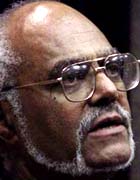Robert Moses, Ph.D., a leading figure in the American civil rights movement, will give an Assembly Series lecture at 11 a.m. April 6 in Graham Chapel.
The annual Martin Luther King Jr. memorial event, sponsored by the Association of Black Students, also serves as the keynote address for the “Documenting Change” symposium (see story, Page 1).

In 1960, Moses, then a young mathematics teacher in New York, traveled south to join the civil rights movement. He emerged as one of the most important organizers of that time, serving as field secretary for the Student Nonviolent Coordinating Committee (SNCC) and director of SNCC’s Mississippi Project, organizing voter registration drives, sit-ins and “freedom schools.”
He was a driving force behind Mississippi’s “Freedom Summer Project” of 1964, an initiative that was instrumental in galvanizing the country behind voter registration efforts in the South.
Furthermore, Moses organized the Mississippi Freedom Democratic Party, which challenged that state’s political mainstream group at the 1964 Democratic Party Convention.
Forty years later, Moses is working for what he considers to be the current civil rights concern: math literacy. He conceived of and directs the Algebra Project, bringing crucial mathematical skills to middle school children in poor communities.
This is a national mathematics literacy effort, using experiential learning and a rigorous curricular process, helping students make the conceptual shift from arithmetic to algebra — a prerequisite, he believes, in gaining full citizenship in today’s technological society. The plan is explained in his 2001 book Radical Equations: Civil Rights, From Mississippi to the Algebra Project, which he co-authored with Charles E. Cobb Jr.
Moses teaches algebra and geometry at Lanier High School in Jackson, Miss.
According to Moses, 60 percent of new jobs will require skills possessed by only 20 percent of those entering the job market now. These jobs require the use of a computer and pay about 15 percent more than jobs that do not.
These numbers will undoubtedly increase in the future, he says, and the hidden culture of computers is mathematics.
So what do voter-registration drives and teaching algebra have in common? For one thing, it follows the principle Moses perfected 40 years ago of changing one person at a time.
“I think of the Algebra Project as working the demand side of the education conundrum that America faces,” Moses says. “In the ’60s, we were young and organizing an older generation to make appropriate demands on the country.”
Now, he adds, “We are older and organizing a younger generation to do the same.”
For his significant contributions to society, Moses was awarded a MacArthur “genius” grant in 1982 and a Heinz Award for the Human Condition in 2000.
Among his many other awards are the Nation/Puffin Prize for Creative Citizenship in 2001 and the Mary Chase Smith Award for American Democracy in 2002.
He earned a bachelor’s degree from Hamilton College and a master’s and doctorate in philosophy from Harvard University.
Assembly Series lectures are free and open to the public. For more information, go online to assemblyseries.wustl.edu or call 935-4620.